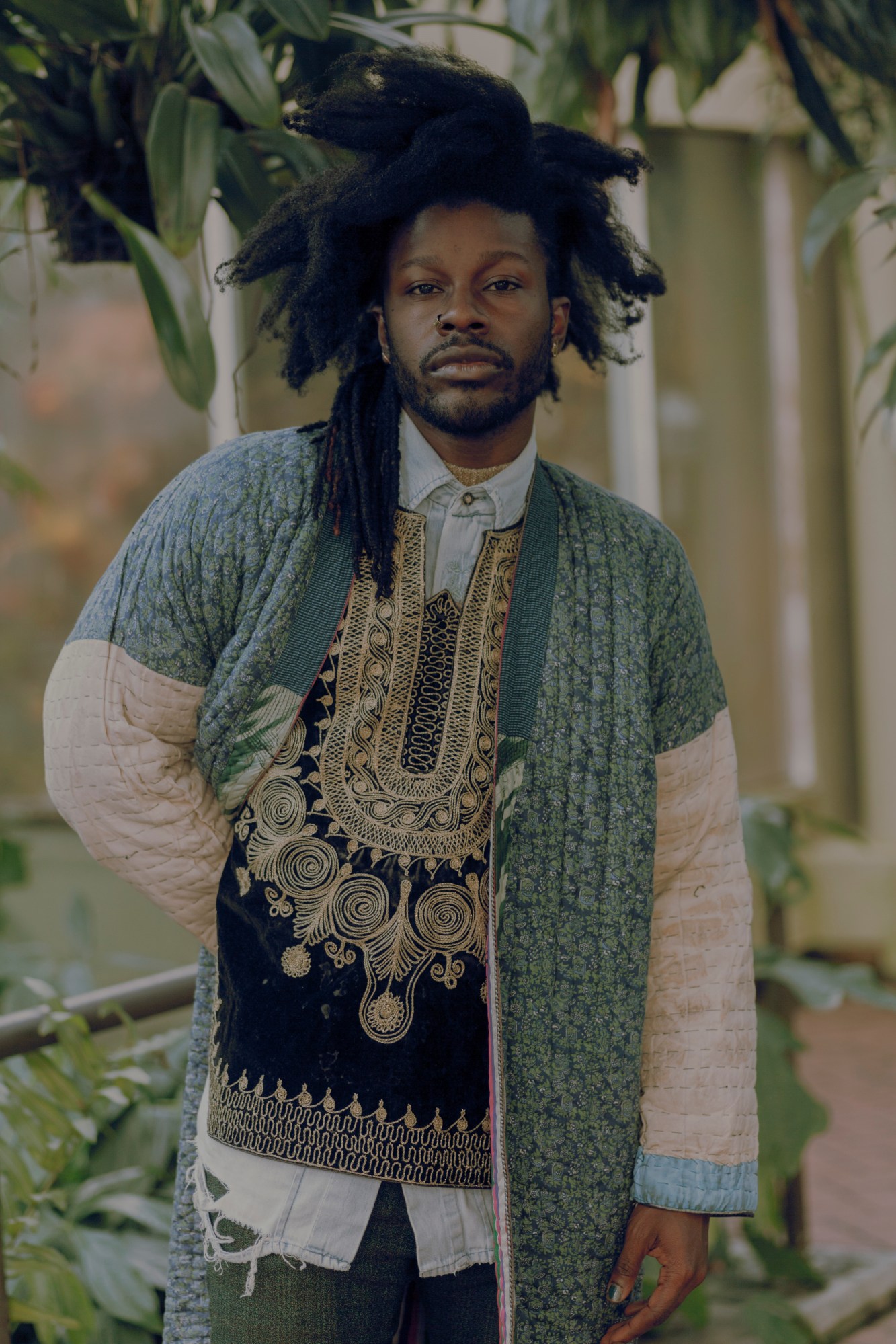“Earth Girls,” the dreamy and subtly groovy opening track of Jesse Boykins III’s fifth studio album, Bartholomew, is a humble ode to women from across the globe. It’s the mature older sibling of Ludacris’s 2005 hit “Pimpin’ All Over the World,” substituting Luda’s desire to conquer women with a tender reverence for them that borders on awe. The song sets the stage for a sonically and conceptually ambitious album in which women are ever present, whether woven into Boykins’s esoteric lyrics or featuring on the tracks themselves, which boast appearances from female showstoppers including Willow Smith, Syd the Kid, Noname, Kilo Kish, and DeJ Loaf.
Boykins, a singer, songwriter, and producer extraordinaire, was born in Chicago, grew up in Miami and New York, and now lives in Los Angeles. His debut album, The Beauty Created, released in 2008, put him on the map in the indie music world as a lyrical mystic with an unassuming, rounded voice and a penchant for genre-hopping. Inquisitive and soulful, Boykins treats his projects as playgrounds for boundary pushing and experimental self-expression. Bartholomew is no different. Originally released as a mixtape in 2016 and re-released this past December by Def Jam as Boykins’s first major label album, it’s a sprawling and loose collection of funky, lush, layered, and vulnerable musings. We get horoscopes and house parties, self-awareness and self-doubt, celebrations of love and painful time apart. At one point in “Indie Girls,” he asks a woman whether she’d prefer to eat kale salad or pizza.
Boykins recorded Bartholomew in a house in Los Angeles over the course of a few weeks, during which time the featured artists would drop in for jam sessions (Willow and Syd, who appear together on “Vegetables,” sat in a circle with Boykins freestyling and eating chicken wings). The result is cohesive, warm, and meditative. The record feels like a hushed and introverted male companion to the cathartic albums released by women like SZA and Kelela in 2017.
A few days after playing a packed room at Le Poisson Rouge in New York, Jesse took some time to discuss his disregard for genre, singing about sex, and trying to capture the complexities of life in every album.
Bartholomew spans many genres — R&B, hip-hop, but also tribal music, samba, and house — yet you don’t seem constricted by them. Do you feel like people will have trouble understanding your music because it refuses to be categorized?
I wish that was the case! But it isn’t. One, I’m black. Two, I’m dark-skinned. And three, I’m soulful. So that automatically makes me R&B. I love R&B music, and that’s of course one of my major influences, but it’s not my only major influence. I love house music. I love moombahton. I love West African folk music. I love West African funk from the 70s. Reggae, dancehall. There are all these things that influence my music, but because of the perception of what my delivery is, people assume that it’s just one thing. I accept that already, though. Just call me whatever. I’m gonna do what I do, create how I want to, and you can categorize it however it makes you feel more close to it.
What made you want to ground this album in your relationships with women?
My whole thing is — and I’ve always felt this way, because women have raised me — the most powerful people in my life are women. They’re the ones who’ve helped me focus on what I love and desire and who try to bring the growth out of me. My homies motivated me, but it was never like, “Hey, we should read this, or look into this.” The introspectiveness and the birth of raw creativity, I feel like, is from a woman.
Was it important for you to explore a range of different relationships women on the album? Sex and romantic relationships, for example, only make up one aspect of the subject matter of Bartholomew.
Sex is an amazing thing, sexuality is amazing! But at the same time, it’s like, the perspective of what sexuality is…is whatever is flowing. I combine it with positivity, I combine it with happiness. I combine it with other things that are less provocative and erotic, and more romantic. For me, a friendship, that’s a romance. Two dudes, you know, “a bromance,” whatever: two people, actually learning each other, and actually giving the same amount of applied effort to do so, and sacrificing, and explaining, and talking about their past and being open and exposing themselves on a deeper level. That kind of energy is what is romantic. That’s what should be celebrated and treasured, not just down to the physical and that’s it. Because the physical is cool, but the physical fades! That’s why I talk about love the way I do in my songwriting.
This is your fifth album now. What did you set out to accomplish?
When you’re listening to an album, you feel it — like Because the Internet by Childish Gambino, that’s an amazing body of work. My man puts you through all the emotions you could possibly go through in one album: you’re sad, you’re happy, you’re nostalgic, you wanna fight somebody, you’re hyped, you’re in love. That’s life. If you can put that — life — into a body of work, then you’re good. That’s what I try to do every time. Like, I hope the life is in here. I’m not gonna talk about the same things every song. I’m not gonna brag about things people can’t connect with and that don’t mean anything once you get them. I’m here for innovation, for quality of design, I’m here for efficiency, and I’m here for hard working. All the other shit comes. The fun comes, the love comes. But those are the things I’m here for. And I gotta put that in my music.
